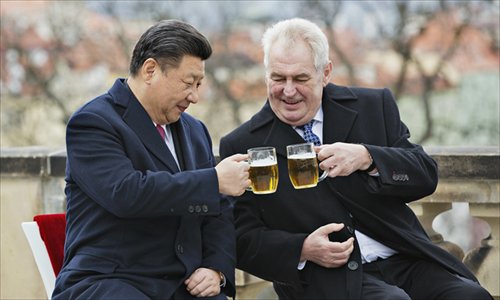Xi to meet Obama in DC
Eighth meeting expected to dispel misunderstandings

Chinese President Xi Jinping (left) and Czech Republic's President Milos Zeman clink glasses of beer on the terrace of the Strahov Monastery in Prague, capital of the Czech Republic on Wednesday. Xi was on a three-day visit to the Czech Republic prior to traveling to Washington, DC for the Nuclear Security Summit, which begins on Friday. Photo: AP
Chinese President Xi Jinping is set to meet his US counterpart Barack Obama Thursday in Washington, DC, which observers hope could help the two countries dispel misunderstandings and reach agreements on North Korea and the South China Sea issues.
Marking the first meeting between Xi and Obama in 2016, Thursday's event will be the eighth meeting between the two presidents since Xi took office in 2013.
As this is also the first meeting between the two since Pyongyang tested a nuclear device in January, observers said it will be a good chance to discuss the North Korean crisis. Also, as the US has been stepping up its accusation against China for "militarizing" the South China Sea, the two sides are expected to discuss this issue.
Taiwan is also expected to be discussed, as pro-independence Democratic Progressive Party head Tsai Ing-wen was elected Taiwan leader in January and will assume office in May.
The US media is keeping close tabs on the Xi-Obama meeting. The New York Times said that Sino-US ties are at the lowest point for 15 years, and the South China Sea issue is "the most prominent point of friction" between the two countries.
"If the South China Sea issue is raised, President Xi will express China's position to the US side," Chinese vice foreign minister Li Baodong said at a press briefing last week in Beijing.
The Xi-Obama meeting will be held on the sidelines of the Fourth Nuclear Security Summit. The Chinese government has said that the two leaders will exchange views on bilateral relations as well as international and regional issues, including the North Korea nuclear issue.
The White House has also made it clear that the two countries will not only talk about cooperation, but also address "areas of disagreement."
Vital cooperation
The meeting would be a great opportunity for the two countries to reach further agreement on the Korean Peninsula nuclear issue, Dong Xiangrong, a research fellow at the National Institute of International Strategy of the Chinese Academy of Social Sciences, told the Global Times on Wednesday.
"It seems that the first round of sanctions has had an effect on North Korea so far," Dong noted.
Earlier this year, after North Korea's nuclear and missile tests, the possible deployment in South Korea of the Terminal High Altitude Area Defense (THAAD) system, a US missile defense system, met with strong opposition from China over fears that the move would harm China's strategic security interests.
"Instead of being a pure technical issue, the possible deployment of the US THAAD system in South Korea is a strategic issue that has a bearing on peace and stability in Northeast Asia," Chinese foreign ministry spokesperson Hong Lei told a daily press conference on Wednesday, when asked whether China will accept a technical briefing from the US side.
China and Russia have already come to a common stance to oppose the THAAD deployment and more negotiations with the US side are expected, Dong said.
Cooperation between China and the US is vital to address the North Korea nuclear issue as it cannot be settled otherwise, Wei Hongxia, a research fellow at the Institute of American Studies under the Chinese Academy of Social Sciences, told the Global Times on Wednesday.
Achievements have been made through China-US cooperation in a range of aspects such as nuclear security. A nuclear security center was opened in Beijing on March 18.
One-China principle
As the two sides are expected to address Taiwan following the polls that elected Tsai, experts said it is a pivotal moment for cross-Straits relations.
"In the past eight years or so, the relationship between the Chinese mainland and Taiwan has been relatively smooth," Wei said.
However, the incoming Taiwan leader might not fully continue Ma Ying-jeou's policy toward the mainland, Wei noted.
"It's necessary to reiterate the fundamental 'one-China' principle to the US side at such a vital moment for cross-Straits relations," Xu Shiquan, honorary director of the Institute for Taiwan, Hong Kong and Macao Studies at the Shanghai Institute for International Studies told the Global Times on Wednesday.
Although the Taiwan question is a "highly sensitive topic" between China and the US, "no compromise could be made on the Taiwan question as it is related to China's core interests," Xu said.
The two countries should promote cooperation instead of confrontation and continue building a "consequential" relationship of mutual benefits regardless of many "annoying voices" in the US, especially on the South China Sea issue, Xu noted.
The attempt to "isolate" China by hyping the South China Sea issue hinders the sound development of China-US relations, he said.
More "dialogue" is needed to dispel "misreading and misunderstanding," Wei said, explaining that this may lead to an exaggerated understanding in the US of China's moves in the region, which would cause tensions to rise among China's neighbors.